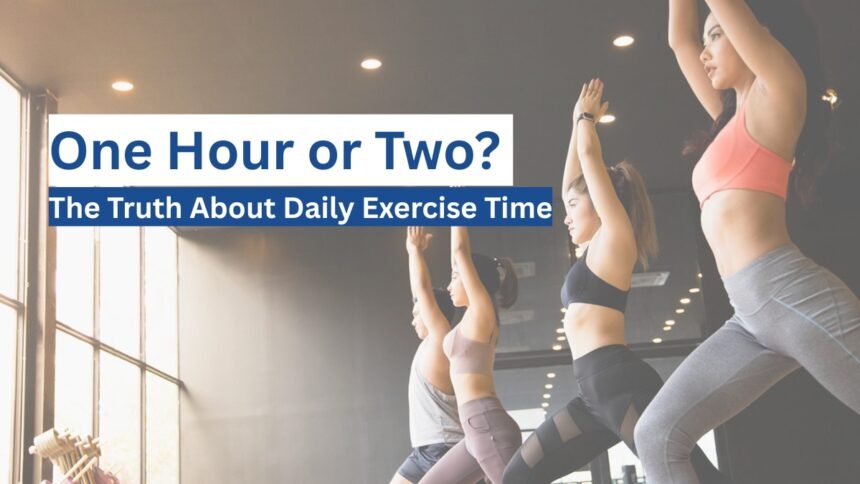Daily Exercise Hours : We all know exercise is essential for a healthy life. But with our busy schedules and unlimited fitness advice online, one key question remains unclear for many: how many hours should you exercise per day? Whether you’re trying to lose weight, build muscle, or just feel better overall, the ideal workout time can vary. In this comprehensive guide, we’ll break down the daily exercise hours you really need, explore workout duration recommendations, and uncover the exercise duration health benefits that can change your life.
From beginners to fitness pros, this post will help you figure out the optimal daily exercise time, how many hours of exercise per week you should aim for, and answer questions like “is 2 hours workout too much?” So, let’s get started on your path to smarter, more effective fitness.
READ MORE :- The Final Verdict on Cardio vs Weights for Fat Loss in 2025: What Really Works?
1. The Basics: How Much Exercise Do Experts Recommend?
According to the World Health Organization (WHO) and the Centers for Disease Control and Prevention (CDC), the general recommendation for adults is:
- 150 minutes of moderate-intensity aerobic activity per week, OR
- 75 minutes of vigorous-intensity aerobic activity per week, PLUS
- Muscle-strengthening activities on 2 or more days per week.
This breaks down to roughly 30 minutes a day, 5 days a week. But how does that translate to your goals?
2. What Are Moderate vs. Vigorous Intensity Exercises?
Before we dive deeper into how many hours to exercise per day, let’s clarify what type of exercise you’re doing.
- Moderate-intensity: Brisk walking, cycling on flat terrain, light swimming, dancing.
- Vigorous-intensity: Running, HIIT, uphill cycling, competitive sports.
The more intense your workout, the less time you need. However, more time doesn’t always mean better results. That leads us to our next point.
3. What Is the Ideal Workout Time for Different Fitness Goals?
Not everyone exercises for the same reason. Your ideal daily workout hours depend on your personal goals:
- Weight Loss: Aim for 45-60 minutes/day of moderate to vigorous activity.
- Muscle Gain: 60-75 minutes/day, focusing on strength training 3-5 days/week.
- General Fitness: 30 minutes/day, mixing cardio and light resistance work.
- Mental Health: Even 15-20 minutes/day of light exercise like walking or yoga can be beneficial.
If you’re new, start small. For example, 15 minutes in the morning and 15 in the evening.
4. Is 2 Hours of Workout Too Much?
This is a popular question, and the answer depends on your lifestyle, recovery, and fitness level.
When 2 Hours May Be Too Much:
- You’re a beginner.
- You’re not getting enough sleep or nutrition.
- You feel constantly sore or fatigued.
When 2 Hours Can Be Okay:
- You’re a trained athlete or bodybuilder.
- You split cardio and strength training with proper rest.
- Your sessions include warm-up, mobility, and cooldown.
The key is to listen to your body. More exercise doesn’t always equal better results. In fact, overtraining can lead to burnout or injury.
5. Optimal Daily Exercise Time Based on Lifestyle
Let’s look at how much exercise fits into different lifestyles:
a. The Busy Professional
- 30 minutes/day is realistic.
- Focus on high-efficiency workouts like circuit training or brisk walking.
b. The Stay-at-Home Parent
- Break it into 10-15 minute sessions throughout the day.
- Include the kids in light movement, stretching, or dance.
c. The Fitness Enthusiast
- Aim for 60-90 minutes/day, depending on goal.
- Mix cardio, resistance, flexibility.
6. Hours of Exercise Per Week: The Golden Formula
Experts suggest:
- 3-5 hours per week for general health.
- 5-7 hours per week for weight loss or improved fitness.
- 7+ hours per week may be ideal for athletes or advanced lifters (with rest days).
This makes your weekly plan just as important as your daily one. Don’t forget to schedule rest days or active recovery like yoga or walking.
7. Benefits of Proper Exercise Duration
Here are the most compelling exercise duration health benefits based on research:
- Improved heart health
- Better sleep and energy
- Reduced anxiety and depression
- Weight management
- Stronger immune system
- Increased lifespan
- Boosted productivity and focus
Just 30 minutes a day can lead to incredible long-term changes.
8. Workout Duration Recommendations by Age Group
| Age Group | Recommended Daily Exercise Hours | Focus Areas |
|---|---|---|
| Children (6-17) | 1 hour/day | Aerobic, muscle & bone-strengthening |
| Adults (18-64) | 30-60 mins/day | Cardio, strength, flexibility |
| Seniors (65+) | 20-45 mins/day | Balance, walking, light resistance |
9. Tips to Stick to Your Ideal Workout Time
- Schedule it like a meeting.
- Start small, then build up.
- Use a fitness tracker or app.
- Try different formats: yoga, weights, dancing.
- Rest smart — active recovery is still progress.
10. Common Myths About Daily Exercise Hours
- “No pain, no gain” — False. Discomfort is okay, pain is not.
- “More time = more results” — Not always. Quality matters.
- “If I skip a day, I’m failing” — Skipping a day is normal. Consistency wins.
- “I must go to the gym” — Home workouts work too!
11. Final Thoughts: Find What Works For YOU
There is no one-size-fits-all answer to how much exercise per day you need. But starting with 30 minutes per day is a great baseline for most people.
Depending on your fitness goals, you can increase it to 60-90 minutes/day or keep it at short but effective 20-minute HIIT sessions. What’s most important is that you’re moving consistently and choosing activities you enjoy.
So, whether you’re walking around the block, lifting weights, or dancing in your living room, you’re already winning.

















